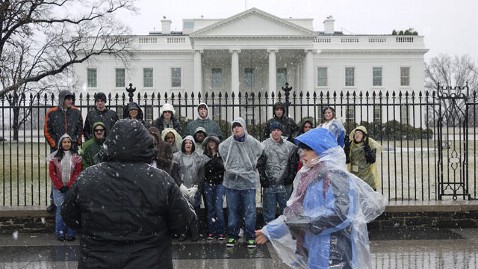Washington Bemoans Tours Lost to Sequester While Locals Have Other Woes

Tourists at the White House. Mandel Ngan/AFP/Getty Images.
One week after lawmakers failed to avert automatic spending cuts - sequestration in Washington-speak - the effects have started to trickle in. But in Washington the main argument over sequestration has been more about tours of the White House than what's going on outside the beltway.
What is going on outside the beltway as a result of sequestration? Not much yet, but some politicians have been telling people to brace for job losses, smaller take-home pay and fewer services available for the most vulnerable Americans.
The Obama administration, trying to show it was budget-conscious, cut, among other things, tours of the White House. Republican senators sent a letter to President Obama yesterday defending the tours and questioning the need to cut them from the budget.
"Self-guided tours at the White House are not the kind of duplicative and wasteful spending that we should be looking to target and the suspension of these tours reeks of political calculation," Sen. John Thune, R-S.D., said in a statement. "Instead of closing the doors of the White House to the American public, the president should look to cut his own wasteful golf outings and frivolous spending."
But take a look at the spending targeted for sequester cuts in Thune's own state. In Sioux Falls, two hospitals stand to lose millions in payments for Medicare services, according to KELO TV. Business owners in Sioux Falls don't seem to expect their economy to take a hit, but the Meals on Wheels program anticipates losing up to 11,000 meals for needy South Dakotans, the station reported last week.
Two senators from Kansas signed the letter, but the writer of a letter to the editor of the Wichita Eagle said he is so floored by sequestration that he labels it "truth stranger than fiction."
"The sequester cuts were designed to be so painful and damaging that they would never be used," Mark Curless of Whitewater wrote. " Yet in our nation's capital, we have two factions fighting for power and control that have unleashed a political 'doomsday bomb' because they cannot work together, solve the country's problems, serve the people who elected them and be civil."
House Speaker John Boehner sent his own letter to constituents this week, taking a dig at the White House and suggesting Americans tour the Capitol instead. He also tweeted five times about White House and Capitol tours in two days. Boehner's other tweets mostly referred to spending as the nation's problem.
Yet in Boehner's own district in Ohio, up to 13,000 employees are facing furloughs at Wright-Patterson Air Force base, according to WHIO-TV. In Cincinnati-Hamilton County, almost 300 low-income children will lose the opportunity to get early childhood education, according to Cincinnati.com.
When asked about these cuts, Boehner spokesperson Michael Steel said the speaker wants to replace the sequester cuts, and that the House had already voted twice to do so. He also pointed to a piece Boehner wrote about the cuts at an Ohio Air Force base in February, a little less than a month before the sequester cuts went into effect.
For its part, the White House has said cutting the tours saves $74,000 per week but has yet to release specifics on what else will be cut in the Executive Branch.
Business leaders, charity administrators and hospital organizers from five different states have all told ABC News variations on the same three things in the first week of the sequester.
1. They think sequestration should never have happened.
"The starting point is that politicians designed the sequestration cuts to be so harsh and unimaginable that they would never let them happen so these things were designed to be hurtful and the fact that they are now letting them come into play is just nothing short of tragic," Bill Clark, executive director of Philabundance, said Friday.
2. They're unsure of what comes next, and they're afraid.
"I think it's safe to say that what's in the air right now is a lot of anxiety," Carlos Rodriguez, executive director of the Food Bank of Monmouth and Ocean Counties in New Jersey, said Friday. "I have an organization that I have to run with employees and I don't know how to plan."
3. They want their leaders to get their fiscal house in order, but they don't think this is the way to do it.
"It's not just the sequestration but the deficit and the inability of Congress to work together. It's going to paralyze everyone, it's going to paralyze the country," Paul Vermette, a New Hampshire business owner, said Monday.
"I am fully supportive of helping our country be fiscally responsible and that means reducing health care costs," Russ Johnson, CEO at San Luis Valley Regional Medical Center, told ABC earlier this week, "but this way of doing it where we just kind of take a broad swath out of Medicare is really ill-conceived when there's so many good ideas and so many proven options where we can remove costs from our system and from health care that don't harm the patient that don't compromise our clinicians or our hospitals."
"It's not the sequester as an event that is hurting us," Fairfax County Supervisor John Cook told ABC News. "It is the continued uncertainty in the business community, including especially the government contracting sector, which is because the federal government hasn't resolved how it's going to deal with the debt."